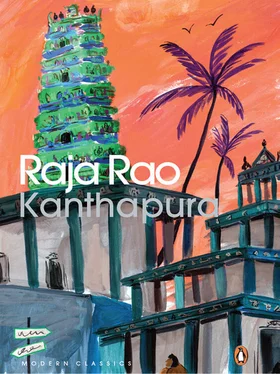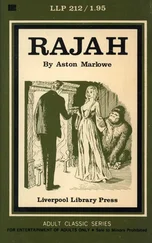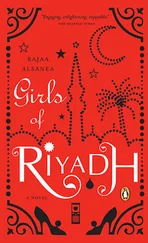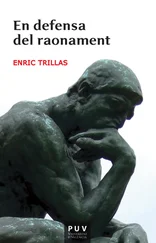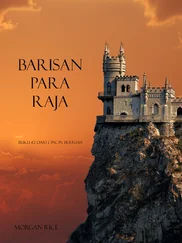Raja Rao - Kanthapura
Здесь есть возможность читать онлайн «Raja Rao - Kanthapura» весь текст электронной книги совершенно бесплатно (целиком полную версию без сокращений). В некоторых случаях можно слушать аудио, скачать через торрент в формате fb2 и присутствует краткое содержание. Год выпуска: 2014, Издательство: Penguin, Жанр: Классическая проза, на английском языке. Описание произведения, (предисловие) а так же отзывы посетителей доступны на портале библиотеки ЛибКат.
- Название:Kanthapura
- Автор:
- Издательство:Penguin
- Жанр:
- Год:2014
- ISBN:нет данных
- Рейтинг книги:3 / 5. Голосов: 1
-
Избранное:Добавить в избранное
- Отзывы:
-
Ваша оценка:
- 60
- 1
- 2
- 3
- 4
- 5
Kanthapura: краткое содержание, описание и аннотация
Предлагаем к чтению аннотацию, описание, краткое содержание или предисловие (зависит от того, что написал сам автор книги «Kanthapura»). Если вы не нашли необходимую информацию о книге — напишите в комментариях, мы постараемся отыскать её.
Kanthapura — читать онлайн бесплатно полную книгу (весь текст) целиком
Ниже представлен текст книги, разбитый по страницам. Система сохранения места последней прочитанной страницы, позволяет с удобством читать онлайн бесплатно книгу «Kanthapura», без необходимости каждый раз заново искать на чём Вы остановились. Поставьте закладку, и сможете в любой момент перейти на страницу, на которой закончили чтение.
Интервал:
Закладка:
They burnt her where she lay, and when the ashes were thrown into the river, Rangamma turns to Bhatta and says:
‘He’s alone. The obsequial ceremonies will be held in our house.’
‘What obsequies?’
‘Why, Narsamma’s.’
‘But who will officiate?’
‘You.’
‘You can offer me a king’s daughter, but never will I sell my soul to a Pariah.’
But Moorthy left us that very night, and some said he went to Seringapatam, and some said to the Tungabhadra, and some said he went over to his brother-in-law of Harihar and there they did it all, but nobody thinks of it now and nobody talks of it, and when Moorthy came back he lived on in Rangamma’s house. They gave him food by the kitchen door as Narsamma did, and he still went to the Pariahs, and he still gave them cotton to spin and yarn to weave, and he taught them alphabets and grammar and arithmetic and Hindi, and now my Seenu, too, was going to go with him. When Seenu would begin to teach them, Moorthy would go up to the Skeffington Coffee Estate, for there, too, were Pariahs and they, too, wanted to read and to write. Moorthy would go there tomorrow.
5
The Skeffington Coffee Estate rises beyond the Bebbur mound over the Bear’s hill, and hanging over Tippur and Subbur and Kanthur, it swings round the Elephant valley, and rising to shoulder the Snow Mountains and the Beda Ghats, it dips sheer into the Himavathy, and follows on from the Balèpur tollgate corner to the Kenchamma hill, where it turns again and skirts Bhatta’s Devil’s fields and Rangè Gowda’s coconut garden, and at the Tippur stream it rises again and is lost amidst the jungle growths of the Horse-head hill. Nobody knows how large it is or when it was founded; but they all say it is at least ten thousand acres wide, and some people in Kanthapura can still remember having heard of the hunter sahib who used his hunter and his hand to reap the first fruits of his plantation; and then it began to grow from the Bear’s hill to Kanthur hill, and more and more coolies came from beneath the Ghats, and from the Bear’s hill and Kanthur it touched the Snow Mountains, and more and more coolies came; and then it became bigger and bigger, till it touched all the hills around our village, and still more and more coolies came — coolies from below the Ghats that talked Tamil or Telugu and who brought with them their old men and their children and their widowed women — armies of coolies marched past the Kenchamma temple, half-naked, starving, spitting, weeping, vomiting, coughing, shivering, squeaking, shouting, moaning coolies — coolie after coolie passed by the Kenchamma temple, the maistri before them, while the children clung to their mothers’ breasts, the old men to their sons’ arms, and bundles hung over shoulder and arm and arm and shoulder and head; and they marched on past the Kenchamma temple and up to the Skeffington Coffee Estate — coolies from below the Ghats, coolies, young men, old men, old women, children, baskets, bundles, pots, coolies passed on — and winding through the twists of the Estate path — by the Buxom pipal bend, over the Devil’s ravine bridge, by the Parvati-well corner — they marched up, the maistri before them, the maistri that had gone to their village, and to the village next to their village, and to the village next to that, and that is far away, a day’s journey by road and a night’s journey by train and a day again in it, and then along the Godavery’s banks, by road and by lane and by footpath, there he came and offered a four-anna bit for a man and a two-anna bit for a woman, and they all said, ‘Is there rice there?’ and he said, ‘There is nothing but rice around us’; and they all said, ‘That is a fine country, for here, year after year, we have had neither rain nor canal-water, and our masters have left for the city’; and so he gave them a white rupee for each and they said, ‘This is a very fine man,’ and they all assembled at night, and Ramanna the elder said, ‘Now we will go, a four-anna bit for a man and a two-anna bit for a woman,’ and they all said, ‘There, there’s rice’; and the pots became empty of water and the sacks began to grow fat with clothes, and the pots on their heads and the clothes in their arms, they marched on and on by the Godavery, by path and by lane and by road; and the trains came and they got into them, and the maistri bought them a handful of popped rice for each and a little salted gram for each, and he smiled so that they all said, ‘It will be fine there, a four-anna bit for a man and a two-anna bit for a woman,’ and the maistri said, ‘You will just pick up coffee seeds, just pick them up as you pick up pebbles by the river.’—’Is that all, maistri?’—’Of course, what else? And the sahib there, he is a fine man, a generous man — you will see. ’; and the trains moved on with the coolies, men, women, children; then plains came with dust and desert and then mountains rose before them, blue mountains, and the trains sneezed and wheezed and snorted and moved on; and the coolies all came out at Karwar and marched on, by the road and street and footpath, and they passed this way beneath hanging mountains, and that way over towering peaks, and the streamlets hissed over their shoulders and purred beneath their feet, and they said there were tigers and elephants and bears in the jungles, and when the children cried, the mothers said, ‘I’ll leave you here with the tigers; but if you don’t cry, I’ll take you over the mountains where you can have milk like water — just like water,’ and the child stopped crying; and the nearer they came, the harder became the road and the stiffer the maistri, and when they had all passed by the Kenchamma hill, the young men, old men, old women, children and mothers, the maistri stood at the back, and when they had all passed by the Estate entrance, one by one, he banged the gate behind him and they all walked up, coolie after coolie walked up, they walked up to the Skeffington bungalow.
And when they had sat themselves down beneath the hanging banyan roots beside the porch, men, women and children, the bundles and baskets beside them, the maistri went in, and came out with the sahib, a tall, fat man with golden hair, and he had spectacles large as your palm, and he looked this side at the men and that side at the women, now at the arms of Pariah Chennayya and now at the legs of Pariah Siddayya, and he touched Madhavanna’s son, Chenna, then but a brat of seven, with the butt of his whip, and he laughed and he wanted everyone to laugh with him, and when the child began to cry, he looked at the child’s face and began to laugh at him, but the child cried more and more, and the sahib rose up suddenly and went in, and came out with a round white peppermint and said he was not a bad man and that everybody would get a beating when they deserved one and sweets when they worked well. ‘Tell them that — repeat them that,’ he said to the maistri who was standing behind him, and the maistri repeated, ‘The sahib says that if you work well you will get sweets and if you work badly you will get beaten — that is the law of the place.’ And they all rose up like one rock and fell on the ground saying, ‘You are a dispenser of good, O maharaja, we are the lickers of your feet. ’; and the women rose behind the men, and they stood fleshy with joy, and turning to the sahib, Madanna’s widow Sankamma says, ‘Sahib — we shall have a two-anna bit for each woman-hand and a four-anna bit for each man-hand?’ And the maistri grew so fierce at this that he howled and spat at her and said his word was the word, and that he hadn’t a hundred and eight tongues, and Sankamma simply put her hand upon her stomach and gaped at him, while the sahib said, ‘What is all this, Anthony?’ and Anthony said something to the sahib in the Christian tongue, and the sahib said, ‘You all go and settle down in your huts — and tomorrow be ready for work at five!’ And they all fell down to kiss the feet of the sahib, and the sahib fetched a few more peppermints and the children all ran to him and the women came running behind them, and the men put their hands shyly between the hands of the women, and at this the maistri grew so furious again that he beat them on the back and drove them to their huts by the foot of the hill. And each one took a hut to himself and each one began to put up a thatch for the one that had no thatch, a wall for the one that had no wall, a floor for the one that had no floor, and they spent the whole afternoon thatching and patching and plastering; and when the evening came they all said, ‘This will be a fine place to live in,’ and they slept the sleep of princes.
Читать дальшеИнтервал:
Закладка:
Похожие книги на «Kanthapura»
Представляем Вашему вниманию похожие книги на «Kanthapura» списком для выбора. Мы отобрали схожую по названию и смыслу литературу в надежде предоставить читателям больше вариантов отыскать новые, интересные, ещё непрочитанные произведения.
Обсуждение, отзывы о книге «Kanthapura» и просто собственные мнения читателей. Оставьте ваши комментарии, напишите, что Вы думаете о произведении, его смысле или главных героях. Укажите что конкретно понравилось, а что нет, и почему Вы так считаете.
